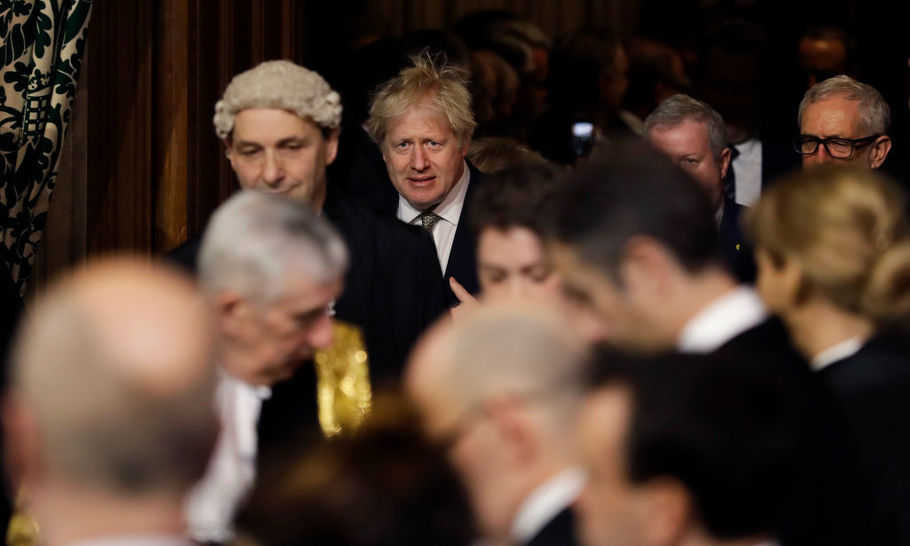Boris Johnson has a chance to become Europe’s leading statesman

Boris Johnson at the state opening of parliament December 19, 2019. (Kirsty Wigglesworth - WPA Pool/Getty Images)
For once, the spectacle of the Queen’s Speech was no mere ceremony. The Sovereign and the Heir sat side by side before a new Parliament, one brimming with faith in their country, hope in the future and charity to all their compatriots. The fount of our laws and our national identity is said to be the Queen in Parliament. And there she was, surrounded by loyal MPs eager to serve her in the cause of reuniting the nation.
The content of what the Prime Minister called “this gracious, most gracious speech” was still a little sketchy, but observers could discern the shape of things to come. There will be a focus on reforming the areas that matter to ordinary people, not the parliamentary navel-gazing of the past few years.
Some Bills will please those of a conservative disposition: more police and tougher sentences, for instance, to restore respect for the law. Other Bills, however, are much wider in application. Tenants (or “renters” as they now prefer to be called) will benefit from the abolition of “no-fault evictions”. Those trying to get onto the housing ladder will enjoy a 30 per cent discount on new properties if they can show that they are “local” residents. Many of the beneficiaries will be young people who probably did not vote Conservative. A spokeswoman for Shelter — a charity that has frequently criticised Tory governments in the past — said the new law on evictions was “fantastic” and would “improve the lives of millions by giving private renters much-needed security”.
This is not, so far at least, a Government that cares only about its own supporters. How will it build on its inevitably temporary popularity to transform the whole Kingdom? Earlier this week, TheArticle turned to one of Britain’s most distinguished historians, Professor Jonathan (J.C.D.) Clark, for some answers. His article here deploys deep scholarship to discuss how future historians may look back on this new Government and the period that has just begun. This weekend we shall be publishing another substantial essay, this time by the leading constitutional scholar Professor Vernon Bogdanor, on devolution, Brexit and the constitution. Both these articles are strongly recommended to readers who care about the past, present and future of our United Kingdom.
Is the Government listening to the voices of scholars such as Professors Clark and Bogdanor? There was one important section in the Queen’s Speech which suggests that the Prime Minister might be all ears. Ministers are “considering the case” for modernising the law of treason to take account of new domestic and international threats, enabling the authorities to prosecute anyone engaged in “harmful activity” with a hostile foreign state. The security services would be given new powers to pre-empt and prevent incidents such as the Salisbury poisonings.
This is a good example of where a Prime Minister with an intellectual hinterland, such as Boris Johnson, is more likely to tread carefully in order to get the balance right between liberty and security than those who ignore historical precedent. Johnson is the author of a biography of Winston Churchill, the first Home Secretary in modern times to confront threats from espionage and terrorism that remain relevant today.
In that biography, published just five years ago, there is a section about Churchill’s heritage that reads like a manifesto for the present Government. It was highlighted in a tweet by Marcus Walker, who points out that it contradicts those “who say Boris has no ideology”.
The great statesman, Boris Johnson writes, decided early on that he would “create a political position that is somehow above Left and Right…thereby incarnating the will of the nation”. Churchill “has a kind of semi-ideology…a leftish Toryism: imperialist, romantic, but on the side of the working man.”
Boris Johnson traces Winston’s “semi-ideology” back to his father, Lord Randolph Churchill, whose short-lived movement, “Tory Democracy”, was in turn indebted to the real founder of the modern Conservative Party: Benjamin Disraeli. Boris evidently identifies strongly with this trio: “Disraeli and the Churchills also have in common the journalism (and in Winston’s case, the novel), the love of show, the rhetorical flourishes, the sense of history, the imperialism, the monarchism, the slight air of camp and the inveterate opportunism.”
Apart from the campiness — true of Disraeli and perhaps Randolph, but surely not of Winston Churchill — Boris is bang on here. His only error in this passage (and it is a revealing one) is to characterise his hero Winston as a novelist — but not Disraeli. Churchill’s novels are forgotten, a footnote to his biography. Disraeli’s, by contrast, have never been out of print and are still read today.
More importantly, the phrase “One Nation” derives indirectly from Disraeli’s 1844 novel Sybil, or The Two Nations, one of the first to draw attention to the plight of the working classes in early industrial Britain. Boris Johnson’s own “semi-ideology” owes a debt to this novel. Yet he has evidently never read Sybil or any of “Dizzy’s” novels.
Perhaps he should. After Disraeli and Churchill, Johnson is the third British Prime Minister to have been both a journalist and a novelist. It is, however, yet another Tory holder of that office to whom he should turn for his motto: William Pitt the Younger. In his last speech at Guildhall, just after the Battle of Trafalgar in 1805, Pitt said: “England has saved herself by her exertions, and will, as I trust, save Europe by her example.”
Boris Johnson now has a chance to become Europe’s leading statesman. As another eminent British historian perceptively remarked after his victory: “Suddenly we are the only major power in Europe with a rock-solid government and a clear line of political progress ahead of us.”





